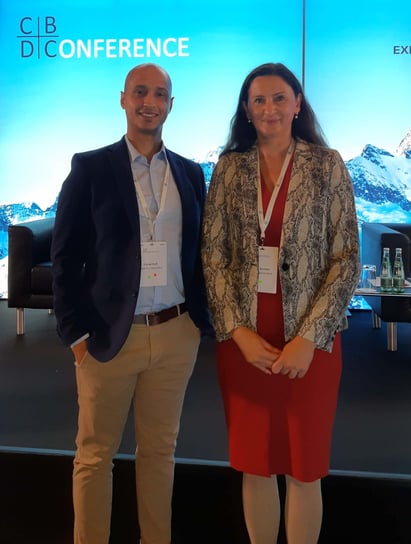Share this
Digital Euro Association partners with the Central Bank of Hungary
by Digital Euro Association on Sep 12, 2022 11:49:55 AM
The Digital Euro Association (DEA) is delighted to announce its partnership with Magyar Nemzeti Bank (MNB), the Central Bank of Hungary. The MNB has established a platform called MNB Innovation Hub for consultation with innovative private sector firms and established a regulatory test environment. MNB launched its first retail CBDC pilot project in September 2020. The DEA’s partnership with MNB will include, amongst others, joint educational efforts around digital currencies, digital currency knowledge exchange, and furthering the DEA’s mission of encouraging new ideas and forward-thinking in the field of digital money, and providing CBDC design inputs.
Deputy Governor Dr. Mihály Patai stressed that MNB would like to be in the forefront of CBDC research. To collect and share knowledge in such a novel area, MNB is keen to join international collaborative forums, such as DEA, where the main experts of CBDC design and development are actively seeking ways to make digital financial services smooth, affordable, and widely available. Paving the way for financial innovation and the future of money is a top priority for MNB. “We would like to be active participants of the discussions around the digital euro beyond the central banking realm, to discover and realize its full potential for the EU as a whole.”
DEA Chairman Dr. Jonas Gross noted that he was thrilled to continue expanding the Digital Euro Association’s global network of influential partners with central banks. “The partnership with the Magyar Nemzeti Bank reaffirms our commitment to impact the debate on CBDCs and collaborate with a community of interdisciplinary experts to further knowledge-exchange about CBDCs. MNB has, through their retail CBDC pilot, provided valuable input around CBDC education and design from which others can learn. We look forward to developing a long and fruitful relationship with Magyar Nemzeti Bank”.

Conrad Kraft (DEA Executive Director) and Aniko Szombati (MNB Chief Digital Officer)
About the DEA
The Digital Euro Association (DEA) is a think tank specializing in central bank digital currencies (CBDCs), stablecoins, crypto assets, and other forms of digital money based in Frankfurt, Germany. In particular, it focuses on the digital euro. It is the DEA's mission to contribute to the public and political discourse through research, education, and by providing a platform and community for policy-makers, technologists, and economists to discuss digital money-related topics. The DEA is committed to independence and excellence, aiming to set the agenda and to shape policy by encouraging new ideas and forward-thinking in the field of digital money.
About MNB
The Magyar Nemzeti Bank is the central bank of Hungary, established in 1924. The MNB is a member of the European System of Central Banks, and its primary objective is to achieve and maintain price stability. Without prejudice to its primary objective, the MNB supports the economic policy of the Government, using the monetary policy instruments at its disposal, while the promotion of environmental sustainability has also been found among the MNB’s statutory objectives. It performs all key central bank functions including holding and managing official reserves in foreign currency and gold, developing and monitoring payment and settlement systems, promoting the stability of the financial system, issuing banknotes and coins, collecting and publishing statistical information, and setting and publishing official exchange rates. MNB fosters digital transformation of the financial system to become more efficient and competitive, which is of utmost importance due to the long-term impacts of the pandemic.
The DEA is committed to independence and the furtherance of the public good through knowledge exchange, encouraging new ideas, and forward-thinking in the field of digital money. Partnerships and collaborations are in no way an endorsement of partner ideologies, products and services, or political regimes.
Share this
- CBDC (44)
- Events (27)
- Partnership (27)
- Stablecoins (25)
- Digital euro (24)
- Quarterly Insights (8)
- ECB (7)
- Privacy (4)
- Thesis Awards (4)
- Article series (3)
- Central bank digital currencies (3)
- Crypto (3)
- Jobs (3)
- Law, regulation & policy (3)
- Tokenized Deposits (3)
- digital yuan (3)
- Academics (2)
- DEC23 (2)
- DEC25 (2)
- Digital Money (2)
- Members Assembly (2)
- MiCA (2)
- Public Hearing (2)
- Regulation (2)
- Sand Dollar (2)
- e-CNY (2)
- monetarypolicy (2)
- Adoption (1)
- Ai (1)
- Blockchain (1)
- Central Banking (1)
- Cross-Border (1)
- DEC24 (1)
- Diem (1)
- Digital Euro Association (1)
- Digital Pound (1)
- Digital Pound Foundation (1)
- Education (1)
- Eurocoin (1)
- Facebook Pay (1)
- FinTech (1)
- Geopolitics (1)
- Novi (1)
- Offline (1)
- Petition (1)
- Project Hamilton (1)
- Public Affairs (1)
- Quantum (1)
- Ripple (1)
- Technology & IT (1)
- USA (1)
- investors (1)
- June 2025 (1)
- May 2025 (4)
- April 2025 (5)
- January 2025 (1)
- December 2024 (3)
- November 2024 (3)
- October 2024 (4)
- September 2024 (2)
- August 2024 (3)
- July 2024 (6)
- June 2024 (1)
- May 2024 (4)
- April 2024 (4)
- March 2024 (4)
- February 2024 (4)
- January 2024 (2)
- December 2023 (3)
- November 2023 (2)
- October 2023 (3)
- September 2023 (5)
- August 2023 (5)
- July 2023 (9)
- June 2023 (5)
- May 2023 (3)
- April 2023 (2)
- March 2023 (7)
- February 2023 (3)
- January 2023 (3)
- November 2022 (2)
- October 2022 (4)
- September 2022 (8)
- August 2022 (11)
- July 2022 (4)
- June 2022 (5)
- May 2022 (3)
- April 2022 (6)
- March 2022 (8)
- February 2022 (6)
- January 2022 (1)
- December 2021 (1)
- November 2021 (1)
- October 2021 (1)


No Comments Yet
Let us know what you think